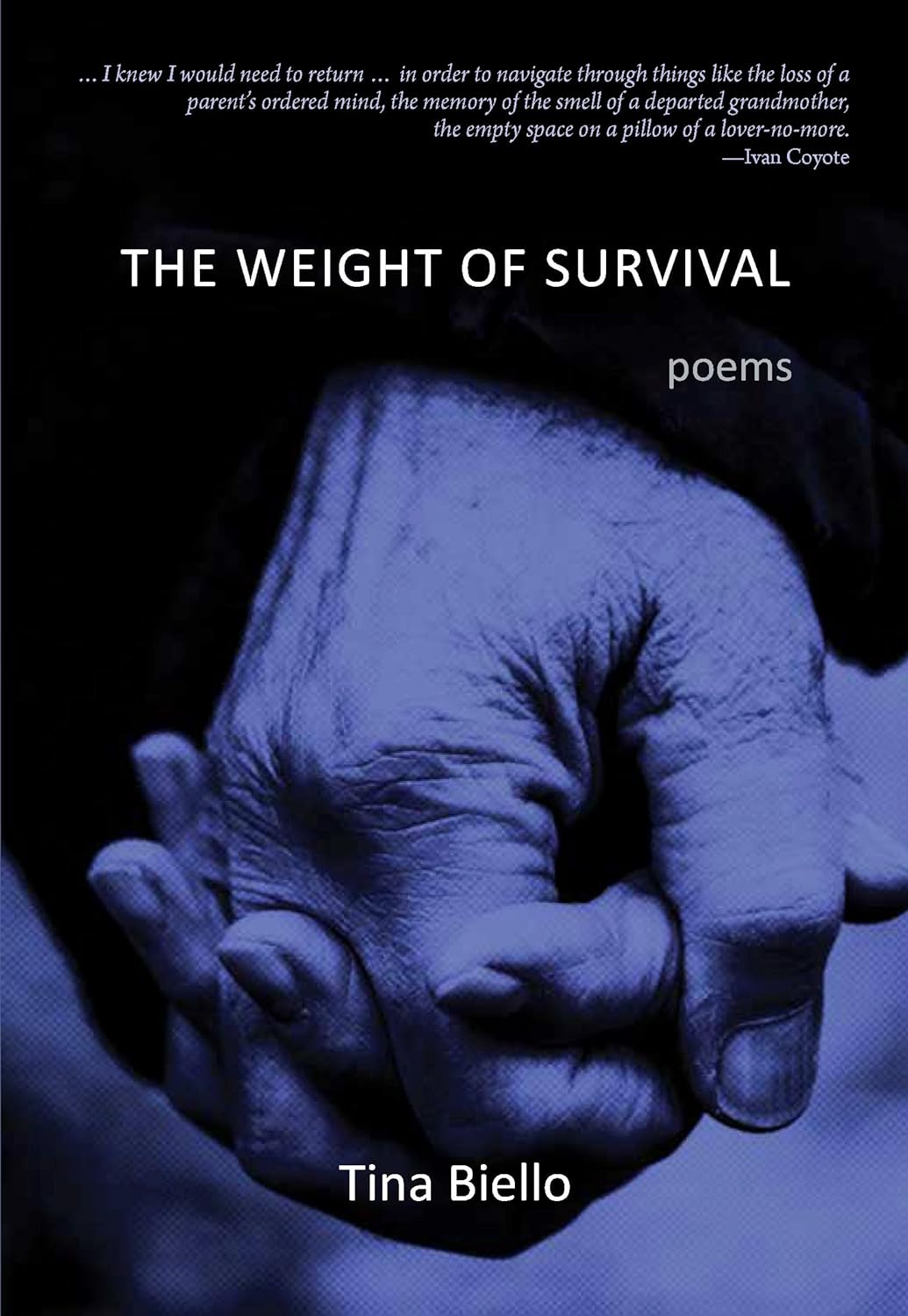Review of The Weight of Survival by Tina Biello

The Weight of Survival
Tina Biello
Caitlin Press, 2024, 72 pages
$20.00
Reviewed by Courtney Heidorn
Language, Smell, & Memory: Tools for Surviving Grief
Tina Biello’s The Weight of Survival tells the story of her Italian immigrant upbringing through free verse and prose poems, inviting the reader to experience her family’s village of Casacalenda. The collection is primarily, and poignantly, a love letter to her ancestry, her mother country, and her childhood home of British Columbia. Biello brings us along on her odyssey of remembrance—remembrance of herself, her family, and, of course, Casacalenda. In combination with her inclusion of folklore curses and proverbs as well as treating time as a transcendent force, Biello successfully writes grief as a form of survival.
Biello begins The Weight of Survival with an author’s note about language, or more specifically, the dialetto di Casacalenda, or, the dialect of Casacalenda. Biello creates a thread of her mother tongue throughout the collection that is not only functional and culturally significant, but lends itself to the powerlessness of grief in poems like “Say Good-Bye” and “The Call.” In the latter, Biello writes about her mother’s death. She translates her father’s words from dialetto di Casacalenda: “our language digs gardens, builds sheds, makes wine” (33). In contrast with her mother’s death, it is her mother’s dialect that continuously creates—it is a language that survives.
Beyond her use of language to portray grief, Biello employs smell and mortality to reclaim memory. Biello primarily uses scent as an agent for remembrance in poems such as “My Death,” “Last Poem about My Mother,” and “On the Last Day of the World.” Biello’s craft is portrayed in her vivid employment of smell to evoke powerful memories in contrast to her mother’s Alzheimer’s. She writes, “I will make sugo, make sure our home / smells like my mother’s kitchen. / Assuming she will be greeting me, / I will create an altar” (13). Smell is an extremely powerful tool for the brain in communicating memory, especially grief. Although her mom’s memory is deteriorating, the power of smell is not, and the memories it produces do not fade either.
Although lesbianism is not the primary theme of The Weight of Survival, Sinister Wisdom readers will particularly enjoy “She Brought Home Women,” “Ode to Rosetta,” and “Queer Dear.” The elements explored above such as memory, language, and grief are beautifully drawn out in these poems.
Biello’s storytelling shines in her prose poems, but their emotional depth is often lost. For example, “Lucia” beautifully captures the dissonance of being native to Canada but not feeling truly at home because of the dreary weather (24). Casacalenda, on the other hand, has bright and vibrant weather, which is more akin to the connotation of her middle name, Lucia. “The Corner Store” is a similar prose poem and includes experimentation with form: Biello includes a recipe for àglie e òglie (30). These poems, although they lack a sense of completeness and depth like the rest of the collection, are nevertheless enjoyable and interesting.
The close of the collection is somber yet beautiful, perfectly showcasing Biello’s thematic genius. “His Ashes” and “Silence” are triumphs. She reminds us that hope can be found through a reclaimed memory of loved ones, remembering that “the years have been long, but the loving good” (66). The Weight of Survival is not a collection to miss.
Courtney Heidorn (she/they) is a Sinister Wisdom intern. She holds a BA in English and Creative Writing from Azusa Pacific University. You can see more of their work in CURIOUS Magazine and at Pearl Press.
"Empowerment comes from ideas."
― Charlene Carruthers
"Your silence will not protect you."
— Tourmaline
"Gender is the poetry each of us makes out of the language we are taught."
— Leila Raven


